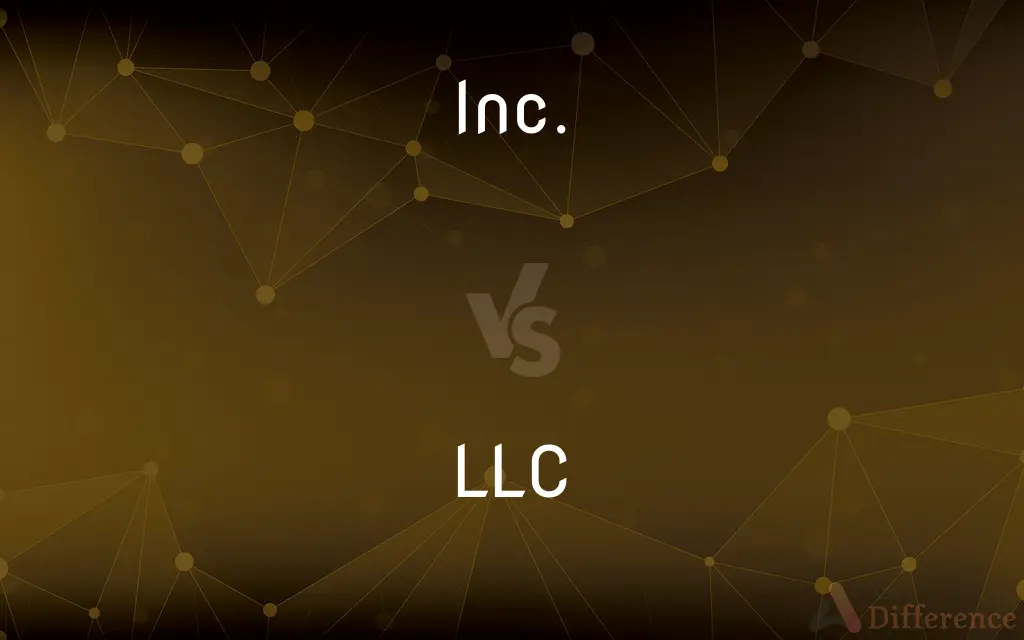Inc. vs. LLC — What's the Difference?
By Tayyaba Rehman — Published on September 27, 2023
Inc. stands for "Incorporated" and is a corporation structure regulated by federal laws. LLC means "Limited Liability Company" and is governed by state laws, offering liability protection and flexibility.

Difference Between Inc. and LLC
Table of Contents
ADVERTISEMENT
Key Differences
Inc. stands for "Incorporated" and typically denotes a corporation, which is an entity regulated by federal statutes. LLC means "Limited Liability Company," governed primarily by state laws. Inc. entities are more suitable for larger organizations with multiple investors. On the other hand, LLCs are generally better for small to medium-sized businesses.
In terms of liability, Inc. offers protection to its shareholders by separating personal and business assets. LLC also provides this separation but often with simpler management structures and less rigid formalities. Inc. requires a board of directors and mandatory shareholder meetings, while LLCs do not.
When it comes to taxation, Inc. can be either a C corporation or an S corporation, affecting how it's taxed. LLCs are more flexible in taxation, allowing for pass-through taxation where business income passes directly to the owners. Both Inc. and LLC have their pros and cons based on their tax implications.
Inc. is more stringent in terms of compliance, requiring periodic filing of financial statements and regular meetings. LLC, being state-regulated, has a more relaxed requirement for compliance and documentation. For both Inc. and LLC, failure to comply with regulatory requirements can lead to dissolution of the entity.
Lastly, raising capital in an Inc. is typically done through the sale of stock. LLCs do not issue stock and generally have a more difficult time raising capital. Both Inc. and LLC offer options for transferring ownership, but Inc. is often viewed as more transferable because of its stock structure.
ADVERTISEMENT
Comparison Chart
Structure
Corporation
Limited Liability Company
Regulation
Federal laws
State laws
Liability Protection
Yes
Yes
Taxation Options
C Corporation or S Corporation
Pass-through or Corporate
Capital Raising
Sale of stock
Member contributions, loans
Compare with Definitions
Inc.
Inc. is an abbreviation for "Incorporated," used to indicate a corporation.
Apple Inc. is a multinational technology company.
LLC
LLCs allow for flexible taxation options.
GreenTech LLC opts for pass-through taxation.
Inc.
Inc. has shareholders who own pieces of the company.
Tesla Inc. has many shareholders.
LLC
LLCs offer liability protection to the owners.
The members of Smith & Co. LLC are not personally responsible for the company's debts.
Inc.
Inc. requires a board of directors and periodic reporting.
IBM Inc. holds annual shareholder meetings.
LLC
LLCs are primarily regulated by state laws.
Creative Arts, LLC must follow California's LLC regulations.
Inc.
Inc. is subject to federal corporate governance standards.
Microsoft Inc. must adhere to federal laws.
LLC
LLCs do not issue stock.
Blue Ocean LLC cannot raise capital by issuing stock.
Inc.
Inc. can issue stock to raise capital.
Alphabet Inc. issued new stock last year.
LLC
LLC stands for "Limited Liability Company," a business structure.
Jane's Bakery, LLC sells homemade goods.
Inc.
Alternative spelling of Inc
Inc.
Abbr of incoming
Inc.
(programming) increment
Inc.
(knitting) increase
Inc.
A Japanese measure of length equal to about two and one twelfth yards.
Inc.
A heterogeneous collection of groups united in their opposition to Saddam Hussein's government of Iraq; formed in 1992 it is comprised of Sunni and Shiite Arabs and Kurds who hope to build a new government
Common Curiosities
Do both Inc. and LLC offer liability protection?
Yes, both offer protection from personal liability.
Is LLC state-regulated?
Yes, LLC is governed by state laws.
What does Inc. stand for?
Inc. stands for Incorporated.
Is Inc. federally regulated?
Yes, Inc. is regulated by federal laws.
What does LLC stand for?
LLC means Limited Liability Company.
Can LLC issue stock?
No, LLCs do not issue stock.
Can Inc. have foreign shareholders?
Yes, Inc. can have foreign shareholders depending on its structure.
Does Inc. require a board of directors?
Yes, Inc. requires a board and regular shareholder meetings.
Can LLC have foreign members?
Yes, an LLC can have foreign members but it depends on state laws.
How is Inc. taxed?
Inc. can be either a C corporation or an S corporation for tax purposes.
Can Inc. issue stock?
Yes, Inc. can issue stock to raise capital.
How is LLC taxed?
LLCs offer flexible taxation options, including pass-through taxation.
Is LLC suitable for small businesses?
Yes, LLCs are generally better for small to medium-sized businesses.
Is Inc. suitable for large businesses?
Yes, Inc. is often suitable for larger, more complex organizations.
Does LLC require a board of directors?
No, LLCs do not require a board of directors.
Share Your Discovery

Previous Comparison
Census vs. Sampling
Next Comparison
HD vs. SDAuthor Spotlight
Written by
Tayyaba RehmanTayyaba Rehman is a distinguished writer, currently serving as a primary contributor to askdifference.com. As a researcher in semantics and etymology, Tayyaba's passion for the complexity of languages and their distinctions has found a perfect home on the platform. Tayyaba delves into the intricacies of language, distinguishing between commonly confused words and phrases, thereby providing clarity for readers worldwide.
















































